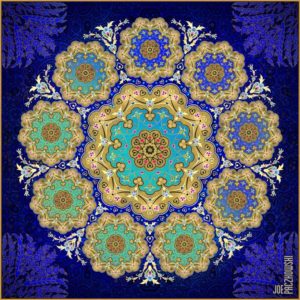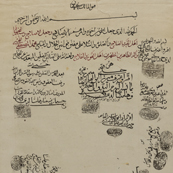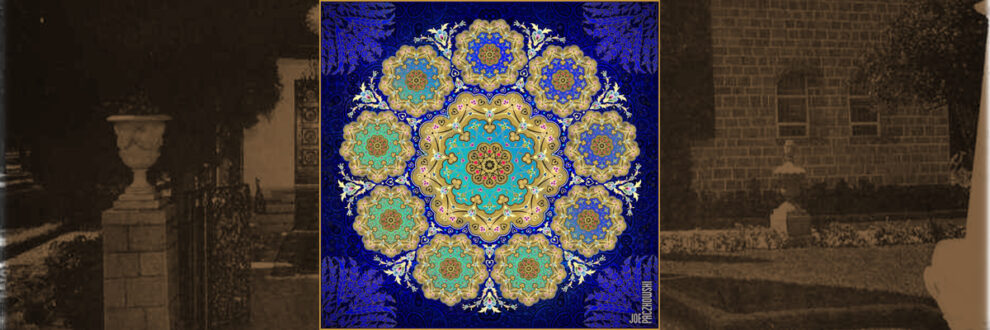
Shaykh Abu Turab
Born: Unknown
Death: Unknown
Place of Birth: Shiraz, Iran
Location of Death: Unknown
Burial Location: Unknown
Among the first of Shaykh Abu Turab’s family to come to Shiraz from Saudi Arabia was Shaykh Husayn Jazaeri, along with his son, Shaykh Muhammad Zahed, also known as Siyyid Mofid. They became the leading Mullás of Shiraz known for their knowledge of the Qur’án and Islamic traditions. Two of their writings are still in use today.
Shaykh Mofid died in the year 1732 and his son Shaykh ‘Abdu’l Nábí replaced him as the leading Mullá. Shaykh ‘Abdu’l Nábí was the first in the family to become Imám Jumih of Shiraz. He was known for his intuition and detachment and was well respected by the folks in the town.
Shaykh ‘Abdu’l Nábí died in the year 1813. Then his son Shaykh Abu Turab, became the Imám Jumih. As the leading Mullá, all knew him for his good nature, purity of motive and extreme kindness. A supporter of the weak and defender of those who suffered injustice at the hands of government officials, in 1840 he travelled to Tihrán to complain about the Governor Farodin Mírzá to Muhammad Sháh for lapses in judgement. The king showed him a great deal of affection and respect, and sent Imám Jumih back to Shiraz in 1843 with more authority and power. Shaykh Abu Turab was known to have spared the Báb from receiving sever castigations on numerous occasions.
Mullá Muhammad Shafi and his mother came to live in Shiraz during the time after the martyrdom of his father, grandfather and the rest of his family. Imám Jumih, noticing Shafi’s intelligence and good nature, arranged for the marriage, which took place at a later date, of Shafi to Khavar Sultan, the Imam’s niece.
When the Mullás of Shiraz signed a death sentence for the Báb, which was ratified by the governor, Imám Jumih refused to sign the petition, and for this reason he was credited with having saved the life of the Báb. The three leading Mullás who had signed the petition for the Báb’s execution were Shaykh Husayn Nazem-ul-Sharieh, Shaykh Mehdi Kajvari, and Shaykh Muhammad ‘Alí Mahalati. Imám Jumih not only did not sign the petition, but he severely chastised the other three Mullás for their actions. He arranged for a large gathering in the Mosque of Vakil, in which the Báb was invited to discuss His claim. The governor Husayn Khan and others thought the Báb would use the occasion to recant His claim. The full description of this gathering is in Nabil’s Narrative: The Dawn Breakers. The Mullás used the occasion to rebuke the Báb, Shaykh Abu Turab asked Him to leave the mosque and to go to His family home. The governor likewise was quite abusive to the Báb. In the mosque, when Shaykh Zalim raised his cane to strike the Báb, another man shielded Him with his shoulder.
The conduct of the Báb in this gathering resulted in the conversion of a number of people, including Shaykh ‘Alí Mírzá, Imám Jumih’s nephew, who became a staunch defender of the Bábís. In that gathering, according to the author Muhammad ‘Alí Faizi, Imám Jumih asked the Báb to sit at the top of the marble pulpit while the Imám Jumih sat directly behind Him, as a sign of respect. The Báb’s tone and the subject of His speech mesmerized the audience.
The kindness and support of Imám Jumih of Shiraz continued toward the Bábís and consequently toward the Bahá’í community. After his death, the Imám Jumih’s son and his grandson, who replaced him as Imám Jumih, continued to be close friends, associates and defenders of the Bábis.
On another occasion, immediately following the Báb’s return from Mecca, He was taken to the governor’s mansion. The Imam Jumih arrived unexpectedly at the mansion. The governor, who was extremely abusive toward the Báb, at one point ordered a servant to slap Him on the face so hard that the Báb’s turban was dislodged. The Imám Jumih objected to the insult and told the governor: “How dare you to hit a Siyyid and insult one, who just returned from Mecca after his pilgrimage?”
Imám Jumih picked up the Báb’s turban and placed it back on His head apologizing for the governor’s behaviour and invited the Báb to sit next to him. Then he addressed the assemblage saying that one should admire the Báb’s dedication and extreme devotion to God. The governor’s plan was to put the Báb in prison after the meeting. However, when he saw Imám Jumih’s affection toward Him, he changed his mind, placing the Báb under house arrest, supervised by the Báb’s uncle. In addition, many people who witnessed the behaviour of the Imám Jumih towards the Báb changed their attitude about Him.[1]
According to Samandar from the footnotes of the Dawnbreakers, Shaykh Abu-Turab was a native of Ishhtihad, and ranked among the leading disciples of Siyyid Kazim. He married the sister of Mulla Husayn. Shaykh Abu-Turab died while he was in prison in Tihran. [2]
He married “Varaqatu’l-Firdaws” (the Leaf of Paradise). Shaykh Abu-Turab was reported to be “a scholar and philosopher such as is rarely met with, and believed with the utmost sincerity and purity of purpose, while such was his love and devotion to the Báb that if anyone did so much as mention the name of His Supreme Holiness (the souls of all beside him be His sacrifice) he could not restrain his tears.” Often he was seen “when engaged in the perusal of the writings of His Supreme Holiness, become almost beside himself with rapture, and nearly faint with joy.” [3]
Khadijih Bagum, the wife of the Bab recalled Shaykh Abu-Turab at her wedding: ‘His kindness towards me and His care for me were indescribable. He and His mother alike showered me with kindness and consideration.’ The household in that small dwelling, destined to be the scene of the birth of a World Faith, consisted of the married couple, the mother of Siyyid ‘Ali-Muhammad, and two black servitors: Fiddih, the woman, and Mubarak, the man.
Some two months passed before the wedding could be arranged. Marriage feasts were held in the house of Mirza ‘Ali, the father of Khadijih Bagum, and in the house of the uncle of Siyyid ‘Ali-Muhammad who had been His guardian. Shaykh Abu-Turab, the Imam-Jum’ih of Shiraz, presided over the ceremony and read the usual oration. As it was customary for a relative of the bridegroom to respond, His uncle Haji Mirza Siyyid ‘Al’ai, accepted the suit. Later, the bride and the Groom were joined in wedlock in the house of Siyyid ‘Ali-Muhammad Himself. [4]
Editor’s Note:
We found that Afsaneh Najmabadi a leading researcher at Harvard University for Qajar Women found properties, located at Ramjard in Fars, which had been sold to Shaykh Abu Turab, the son of Shaykh Mofid, according to a previous contract. Now Mirza Abu al-Qasim Mir’ab, son of Mirza

Muhammad, on behalf of Khadijah Sultan Baygum and Raziyah Sultan Baygum (Bibi Sahib), the daughters of Mirza Ja‘far (the grandfather of the author of this document), claims that some of these properties are their share of inheritance. Thus, a settlement is signed between Mirza Abu al-Qasim, on behalf of Khadijah Sultan Baygum and Raziyah Sultan Baygum, and Shaykh Abu Turab for sixty tumans compensation.
Source:
1 Hussein Ahdieh. Nayriz Heroes. Bahai-Library.com: Winters, Jonah
2 Nabíl-i-Zarandí aka Nabíl-i-A’ẓam. The DawnBreakers. Footnotes located on p. 39
3 ‘Abdu’l-Baha. Memorials of the Faithful. Bahai.org. p.181
4 HM Balyuzi. Kidlington, Oxford: George Ronald Publisher. November 1980
Images:
Profile Image by Joe Paczkowski
Settlement Deed image – Courtesy of Harvard University – qajarwomen.org





Add Comment